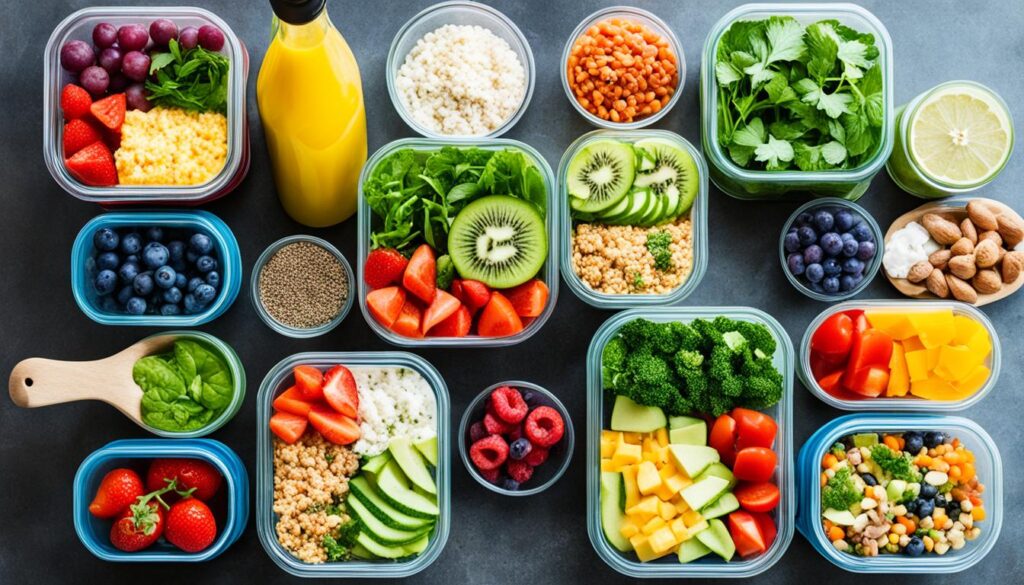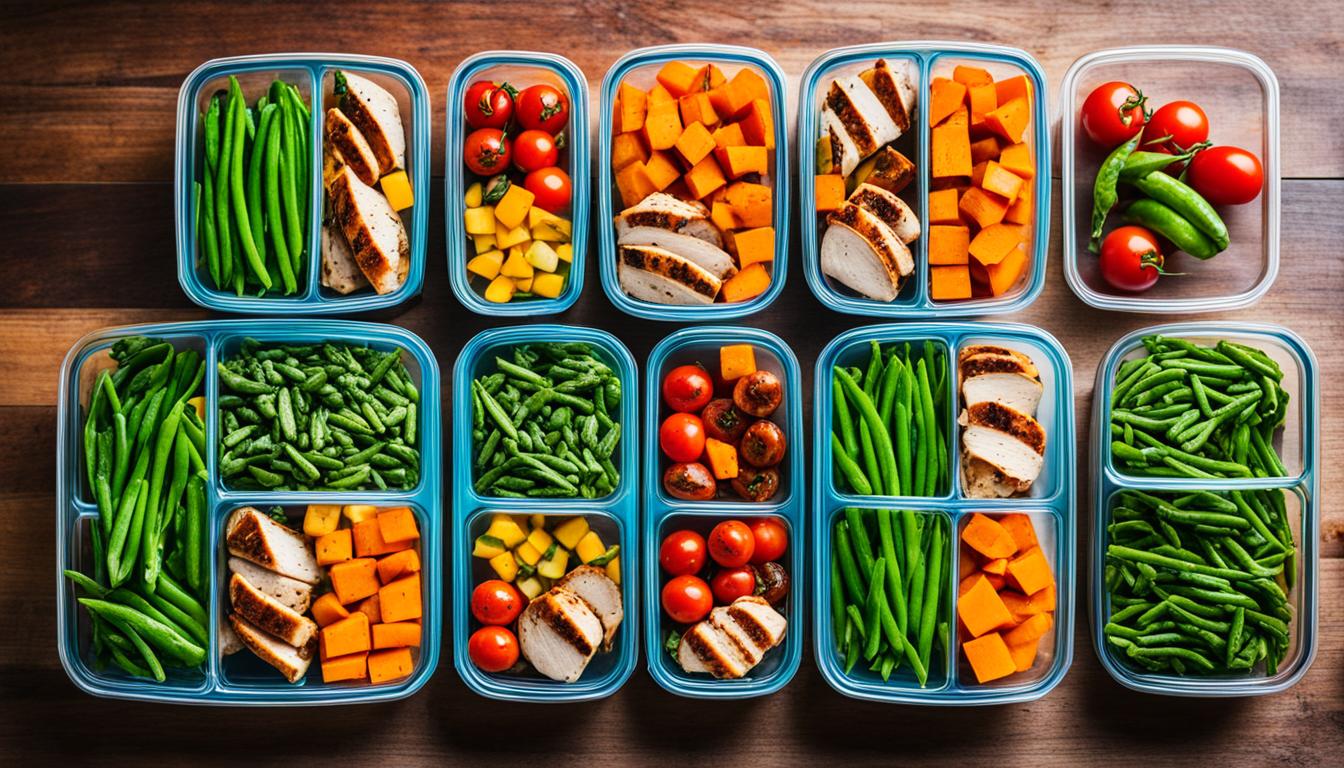Did you know that food sensitivities like lactose intolerance affect about 68% of people worldwide? This can lead to bloating. If you’ve felt swollen after eating certain foods, you’re not alone. Many people deal with bloating due to certain foods, unhealthy eating, or digestive issues.
Your journey to a bloat-free weekend begins here. By knowing what you eat and using smart meal prep, you can eat well without discomfort. This guide will show you how to make tasty meals that help you feel better and digest better too.
With foods like ginger, asparagus, and yogurt, and recipes like Chicken Shawarma with Yogurt Sauce and Fish Tacos with Kiwi Salsa, you’re all set for a great weekend.
Key Takeaways:
- Understanding food sensitivities, like lactose intolerance, can help prevent bloating.
- Integrating bloat-reducing foods such as ginger, asparagus, and Greek yogurt into your meals can enhance digestion.
- Smart meal prep is integral to maintaining a healthy, bloat-free diet over the weekend.
- Recipes like Chicken Shawarma with Yogurt Sauce and Fish Tacos with Kiwi Salsa offer tasty, anti-bloat solutions.
- Balancing your diet with lean proteins and high-fiber foods can significantly reduce bloating symptoms.
With these easy and healthy tips, your weekend meal prep can be a fun way to support your health. Say goodbye to bloating and hello to a great weekend with nutritious food!
Understanding the Importance of Bloat-Free Diets
Eating a bloat-free diet is more than just feeling good. It’s key for your digestive health. Foods rich in fiber and anti-inflammatory help keep your gut healthy. This is vital for your overall health.
Intuitive eating means listening to what your body needs. It lets you eat various foods without feeling guilty. Eating whole plant foods and foods that help reduce bloating can make your diet balanced.
Probiotics, fermented foods, and high-fiber ingredients help your digestion. They make you feel better overall.
Drinking a lot of water at once or overeating can cause natural bloating, which isn’t necessarily a health concern.
It’s important to know that bloating can change due to many reasons. For those who often feel bloated, finding the right foods and habits is crucial. Women often face more issues like IBS and constipation.
- Adding probiotics or fermented foods to your diet.
- Focusing on lighter foods in meals following bloating episodes.
- Incorporating high-fiber foods.
Ginger is an anti-inflammatory food that helps reduce bloating and supports digestion. But, if bloating doesn’t go away or gets worse, it could be a sign of a serious health issue. This includes Coeliac disease or ovarian cancer, so you should see a doctor.
| Key Points | Statistics |
|---|---|
| Prevalence of frequent bloating | 10-25% of healthy people |
| Bloating prevalence in women | Higher than in men |
| Constipation cases | 1 in 7 people |
| Irritable Bowel Syndrome (IBS) | 1 in 5 people |
Effective Weekend Meal Planning Strategies
Planning your meals for the weekend is key to meal prep success. It keeps things organized and makes healthy eating easy. Let’s look at two main parts that help you succeed: setting goals and making a good shopping list.
Setting Realistic Goals
Starting with realistic goals is crucial for meal planning. Look at your schedule and what you need to eat. Make sure your plan meets the USDA Dietary Guidelines for nutrients.
Try to get 25 grams of fiber a day if you’re a woman, and 38 grams if you’re a man. Include 1-2 whole grains and 2-3 protein sources in your meals. Pick 3-4 fruits and vegetables that last two weeks. This way, you avoid stomach problems like aches and diarrhea.
Making a Shopping List
Having an organized shopping list keeps your meal prep smooth. It makes sure you have all you need for the week. This cuts down on trips to the store, saving time and reducing waste.
Use a weekly meal planner to help with your organized shopping. Try meal planning apps like Mealime or Paprika for more help. Set aside specific times each week for planning, shopping, and prepping.

By using these tips, you’ll get better at meal prep and eat more healthily. Remember these ideas as you start your journey to a healthier life.
Top Ingredients to Include for a Bloat-Free Diet
Choosing the right foods is key to staying bloat-free. Adding anti-inflammatory ingredients, natural diuretics, and gut health foods can make your meals better. Foods like asparagus, ginger, and yogurt are great for their health perks.
Asparagus
Asparagus is known for fighting bloating. It’s a top natural diuretic thanks to its asparagine content. This helps by increasing urine production, which removes excess water and salt. Plus, it’s full of fiber, which supports gut health.
Ginger
Ginger is famous for its anti-inflammatory effects, making it a key gut health food. It helps ease bloating and gas by calming the stomach. You can use ginger fresh, grated, or in teas to boost flavor and health.
Yogurt
Yogurt is packed with probiotics, which are crucial for a healthy gut. Eating yogurt often can improve digestion and cut down on bloating. Pick plain, unsweetened types to get the most gut benefits. Enjoy it alone, in smoothies, or as a sauce base.
| Ingredient | Health Benefit | Usage Tips |
|---|---|---|
| Asparagus | Natural Diuretic, High in Fiber | Roast with olive oil and garlic for a delicious side dish |
| Ginger | Anti-inflammatory, Improves Digestion | Grate into teas or marinades |
| Yogurt | Probiotics for Gut Health | Include in smoothies or as a base for sauces |
Adding these ingredients to your meals boosts flavor and supports a bloat-free diet. Embrace anti-inflammatory ingredients, natural diuretics, and gut health foods for a healthier digestive system.
Bloat Free Weekend Meal Prep: Easy & Healthy Tips
Starting your weekend meal prep can change how you eat healthily. To prevent bloat and keep meals simple yet nutritious, use ingredients like ginger, asparagus, yogurt, and kiwi. These help reduce belly bloat. Try a grilled chicken tostada with sweet kiwi topping or a pasta salad with shrimp and fruit salsa for a tasty, healthy weekend.

Think about making meals ahead with protein-rich foods like grilled chicken with watermelon salsa. This dish gives you 33 grams of protein per serving. For vegetarians, a tahini-yogurt sauce with mushrooms is a great choice that’s also bloat-free. Using the right storage containers keeps your food fresh and ready to eat.
Hydration is key to preventing bloat. Adding water-rich foods and cutting down on sodium helps balance your system. A rotisserie chicken with pesto and asparagus is a quick, easy way to follow this plan.
For more variety, try garlic butter salmon with veggies or spaghetti with ginger-soy marinated shrimp. These dishes make your meal prep routine exciting and bloat-free. They turn simple healthy meals into a key part of your diet.
Recipes for Quick and Healthy Meals
Having a collection of easy dinner recipes is key to nourishing meal prep. These recipes save time and support healthy cooking habits. We present two dishes: Chicken Shawarma with Yogurt Sauce and Fish Tacos with Kiwi Salsa. They are quick, bloat-free, and full of flavor.
Chicken Shawarma with Yogurt Sauce
This recipe is perfect for a quick, flavorful meal. The chicken is marinated with spices like cumin, paprika, and turmeric. Then, it’s grilled to perfection.
Serve it with a yogurt sauce made with garlic and lemon juice. This sauce complements the chicken’s spices and helps with digestion. The dish is tasty and includes ingredients like olive oil, lemon juice, and herbs, promoting healthy cooking.
Fish Tacos with Kiwi Salsa
Try these Fish Tacos with Kiwi Salsa for a fresh twist on traditional tacos. This meal is quick and healthy, bursting with freshness. It combines zesty kiwi salsa with pan-seared fish fillets.
The kiwi adds a sweet contrast to the chili-rubbed fish, making it a great choice for those avoiding bloating. Ingredients like kiwi, red cabbage, and lime juice keep the dish light and refreshing. Fish like salmon or tuna also provide anti-inflammatory omega-3 fats, making it a healthy option.
Trying out these recipes will improve your meal prep and ensure you eat nourishing, bloat-free meals. These recipes are fast to make and use ingredients that help reduce bloating and support health.
Healthy Meal Prep Tips for Beginners
Starting healthy meal prep can change your life if you’re looking to avoid bloating. As a beginner, it’s important to know the basics. This will make the process easier and keep you excited. Let’s explore some key tips that make meal prep fun and effective for beginners.

First, get the right meal prep containers. Containers that seal tight keep your food fresh for 5-7 days in the fridge. For longer storage, pick containers that are safe for the freezer. This is a crucial step for starting off right with meal prep.
- Choose containers that fit your lifestyle, making sure they work well in the microwave and freezer.
- Freezing meals and reheating them in the microwave takes about 4-5 minutes, saving you time after a long day.
When planning meals, balance nutrition with variety. Aim for about 1400-1700 calories daily, based on your weight loss goals. Include high-fiber foods, like a hot cereal mix with 6 grams of fiber per serving, to help you feel full.
Using simple meal prep strategies like batch cooking can make your week easier. Cook meals twice a week to keep them fresh. Here are some recipes to consider:
- 30-minute dinner recipes: Great for busy nights.
- 20-minute couscous bowls: Quick and nutritious.
- 10-minute cabbage slaw: A simple, healthy side dish.
Always cool your cooked food before putting it in the fridge or freezer. This is key for food safety. Soaking veggies in cold water for 15 minutes helps keep them fresh in the fridge, ensuring they stay crisp.
To make thawing and storage easy, freeze your meal prep in airtight containers or freezer bags. Prepping ahead saves time and ensures you have healthy meals ready when you need them.
By following these simple meal prep tips, starting healthy meal prep won’t feel overwhelming. Embrace these basics to confidently begin your meal prep journey. This will lead you to a healthier, bloating-free life.
How to Maintain a Balanced Healthy Eating Plan
A balanced diet is key for staying healthy. It helps prevent chronic diseases and supports overall wellness. Let’s look at some easy ways to keep eating healthy.
Adding different foods to your meals is a great strategy. Your diet should have proteins, fats, carbs, fiber, and vitamins and minerals. Research shows eating a variety of foods is important. For instance, eating three whole grains a day can help you lose belly fat over time.
How much you eat matters too. Stop when you’re full to avoid overeating and improve digestion. Making smart choices about how much to eat helps with calorie control and reduces bloating.
Sticking to healthy eating habits is crucial for long-term health. Foods like nuts and chickpeas can help you feel full longer. They’re full of fiber and protein. Eating regular meals and snacks with a mix of fats, proteins, and carbs keeps your energy up.
Here’s a table comparing nutrient-dense options and their benefits:
| Food | Benefits |
|---|---|
| Green Tea | Aids in burning abdominal fat |
| Lentils | Prevent bloating and constipation |
| Oats | High in fiber, helps reduce belly fat |
| Avocados | High in healthy fats and promotes satiety |
| Eggs | Rich in protein, aids in muscle building |
Drinking enough water is also important. It helps with digestion and keeps you hydrated, making you feel more energetic and alert.
It’s not about giving up your favorite foods. It’s about eating them in moderation. The secret to good nutrition is being flexible, varied, and consistent in what you eat.
Sunday Meal Prep: A Simple Guide to Start
Starting a Sunday meal prep routine can make your week healthier and more organized. This easy guide will help you plan and organize your meals without stress. It makes sure your meal prep is efficient and easy.
Morning Preparation
Begin your Sunday meal prep in the morning. Start by washing and cutting your vegetables. Then, organize your pantry and prepare your proteins. This lays the groundwork for a smooth cooking process later.

Afternoon Cooking
Use the afternoon for the main cooking. Cook different dishes at once using methods like baking, boiling, and grilling. Try to spend about one to two hours on this. Aim to make meals with a protein, vegetable, and starch for balanced nutrition all week.
Evening Storage
At the end of the day, focus on storing your food. Let all cooked meals cool before putting them in containers. This is key to avoid spoilage and food poisoning. Keep salads and dressings separate to keep salads fresh. Good storage keeps your meals fresh and easy to grab, helping you stick to your diet.
| Step | Time Frame | Focus |
|---|---|---|
| Morning Preparation | 1-2 hours | Washing, cutting, organizing |
| Afternoon Cooking | 1-2 hours | Cooking, multitasking, batch prepping |
| Evening Storage | 30 minutes | Portioning, cooling, storing |
Quick Meal Prep Ideas to Save Time
Looking for ways to save time in the kitchen? Using efficient cooking techniques can make your life easier. Let’s explore some strategies to make meal prep quick and fun.
Using One-Pot Recipes
One-pot recipes are perfect for busy people. They cut down on cleanup and blend flavors well, making tasty meals.
- Try dishes like chili, risotto, or casseroles that combine proteins, grains, and veggies all in one pot.
- Utilize a slow cooker for meals like Bolognese or soups, which allows you to “set it and forget it.”
- Double batch recipes so you can freeze half for another night’s dinner, offering a convenient backup on particularly busy evenings.
Prep Ahead Smoothies
Prepping smoothies ahead can make your mornings easier. It ensures you start the day with a healthy drink without the rush.
- Freeze portions of fruits and greens in ice cube trays for easy blending.
- Store pre-measured ingredients in containers, just dump and blend when you’re ready.
- Experiment with combinations that include fiber-rich foods like avocado and beans to help with satiety and weight management.
Batch Cooking Basics
Batch cooking can save you a lot of time during the week.
- Prepare a week’s worth of lunches on Sundays to ensure you have healthy options ready to go.
- Keep an inventory list of pantry and fridge items to streamline meal prep and avoid duplicate purchases.
- Use plastic or takeaway-style containers for organized storage of prepped meals and snacks.
For more efficient cooking techniques, consider using the Healthy Mummy app. It offers quick and healthy recipes for busy people. These ideas help with time-saving meal prep and keep your diet balanced and nutritious.
Conclusion
Starting a meal prep for a bloat-free weekend takes time and effort. It needs consistent work, smart planning, and knowing what foods and methods help a healthy life. This guide offers tips to help you get a diet that relieves bloat now and keeps you healthy long-term.
Meal prep saves time and lowers stress by cutting out daily meal decisions. Spending a few hours each weekend lets you make meals that fit your diet and taste. It helps you follow a healthy eating plan, saves money, and stops impulse buys.
Make sure to keep your meals varied and balanced. Use fruits, veggies, whole grains, legumes, nuts, and seeds. Items like brown rice, quinoa, and chickpeas are great for meal prep. They make sure you have healthy, bloat-free meals ready. Also, storing food right, like labeling and freezing, keeps it fresh and nutritious all week.
The secret to good meal prep and a bloat-free diet is being consistent, planning well, and being open to what works for you. With these tips, every weekend brings you closer to more energy, better digestion, and a healthier life.
FAQ
What are some key tips for bloat free weekend meal prep?
What are the benefits of a bloat-free diet?
What should I consider when planning my weekend meals?
Which ingredients are best for a bloat-free diet?
How can I make weekend meal prep easier?
Can you share some quick and healthy weekend meal prep recipes?
What is the best way for beginners to start meal prepping?
How do I maintain a balanced eating plan to avoid bloating?
What is the best way to structure a Sunday meal prep?
What are some quick meal prep ideas to save time?
Source Links
- https://www.humnutrition.com/blog/anti-bloating-meal/ – The Ultimate Anti-Bloating Meal Plan: A Week of Delicious and Gut-Friendly Dishes
- https://justfortummies.co.uk/diet-plans/bloating-diet-plan/ – Bloating Diet Plan | Read Now | Just For Tummies
- https://www.today.com/health/diet-fitness/get-rid-of-bloating-gastroenterologists-rcna84753 – 11 ways to get rid of bloating, according to gastroenterologists
- https://www.eatingwell.com/article/7921422/why-bloating-can-be-normal-healthy-according-to-a-dietitian/ – Why Bloating Can Be Normal and Healthy, According to a Dietitian
- https://www.bbcgoodfood.com/howto/guide/how-eat-avoid-feeling-bloated – What causes bloating and how can I reduce it?
- https://www.eatingwell.com/article/290585/3-day-meal-plan-to-help-you-poop/ – 3-Day Meal Plan to Help You Poop, Created by a Dietitian
- https://bcdietitians.ca/blog/6-steps-to-meal-plan-for-the-week/ – 6 Steps to Meal Plan for the Week – BC Dietitians
- https://eatyournutrition.com/simple-meal-planning-101-the-basics/ – Simple Meal Planning 101: The Basics – Nutrition
- https://www.mindbodygreen.com/articles/meals-to-help-you-beat-the-bloat-that-take-less-than-30-minutes – Meals To Help You Beat The Bloat (That Take Less Than 30 Minutes)
- https://www.womenshealthmag.com/uk/food/a705512/3-day-de-bloat-recipes-meal-plan-guide/ – This 3 Day Meal Plan Will Help You De-Bloat This December
- https://www.eatingwell.com/article/7943715/what-to-eat-drink-for-bloating/ – 6 Things Dietitians Eat and Drink When They Want to Debloat
- https://www.eatingwell.com/gallery/7882623/dinner-recipes-to-reduce-bloat/ – 26 Dinners to Help You Debloat After You’ve Eaten Too Many Holiday Cookies
- https://www.womenshealthmag.com/weight-loss/a19992536/7-day-meal-plan-reduce-bloat/ – This 7-Day Meal Plan Gets Rid of Bloat Fast
- https://www.humnutrition.com/blog/non-bloating-meals/ – Your Perfect Day of Bloat-Free Eating
- https://www.eatingwell.com/gallery/7822434/recipes-when-you-feel-bloated/ – 23 Recipes for When You Feel Bloated
- https://www.healthline.com/health/rheumatoid-arthritis/seven-day-meal-plan – Anti-Inflammatory Meal Plan: Recipes for 7 Days
- https://www.eatingwell.com/gallery/11567/meal-prep-recipes-to-help-you-lose-weight/ – Meal Prep Recipes to Help You Lose Weight
- https://www.asweetpeachef.com/meal-prep-for-weight-loss/ – 7 Day Meal Prep For Weight Loss
- https://www.eatingwell.com/article/290676/7-day-flat-belly-meal-plan/ – 7-Day Meal Plan to Help Lose Belly Fat, Created by a Dietitian
- https://www.helpguide.org/articles/healthy-eating/healthy-eating.htm – Healthy Eating: Choosing Healthy Foods for a Balanced Diet
- https://blog.blueapron.com/how-to-create-a-gut-healthy-meal-plan/ – How to Create a Gut-Healthy Meal Plan – Extra Helpings
- https://greatist.com/eat/beginners-guide-to-meal-prep – A Beginner’s Guide to Meal Prep
- https://www.organizeyourselfskinny.com/meal-prep-for-weight-loss/ – Meal Prep For Weight Loss
- https://www.healthline.com/health/crohns-disease/recipes – 7-day Meal Plan for Crohn’s Disease
- https://www.healthymummy.com/15-ways-to-save-time-on-your-weekly-meal-prep/ – 15 ways to save time on your weekly meal prep
- https://www.eatingwell.com/article/2061107/how-to-meal-prep-for-a-week-of-flat-belly-lunches/ – How to Meal-Prep for a Week of Lunches to Help You Lose Belly Fat
- https://plantabygia.com/how-to-meal-prep-effectively-a-guide-to-simplifying-your-plant-based-lifestyle/ – A Guide to Simplifying Your Plant-Based Lifestyle – PlantabyGia
- https://advancedfoodintolerancelabs.com/blogs/news/meal-planning-strategies-for-minimizing-bloating-with-food-intolerances?srsltid=AfmBOorBguCUt3yB8oHQDpUY-zh-XPRtkgNGu4x-nmg3luHIDEQ5F2Vh – Meal Planning Strategies for Minimizing Bloating with Food Intolerances

